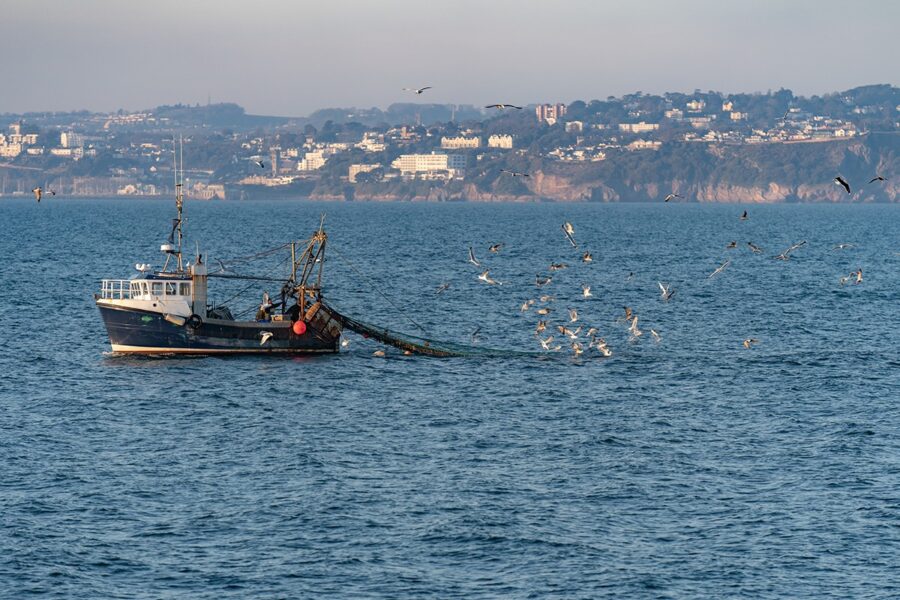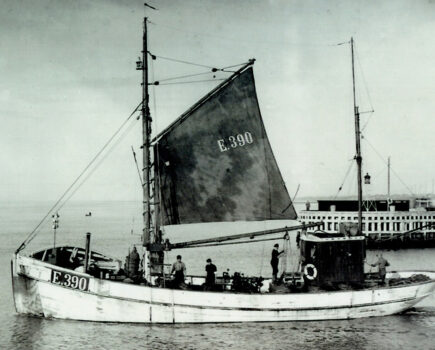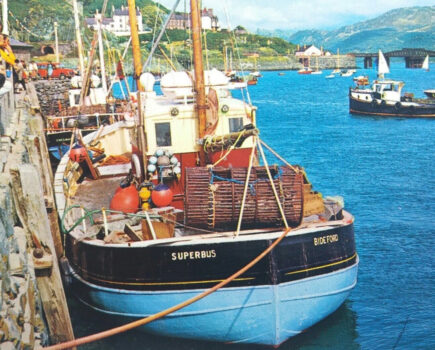For UK fishermen used to seeing their livelihoods impacted by annual quota negotiations, new IFCA byelaws or a drop in fish prices due to Covid, arcane international discussions that have dragged on for years, with no probability of a breakthrough, may seem of no relevance at all, reports Andy Read.
However, World Trade Organisation (WTO) discussions due to start this Tuesday (30 November) may have huge implications for all UK fishermen, both good and bad.
The WTO has 164 countries in membership, and aims to reduce barriers to international trade. Crucial to this agreement and harmonisation on issues that prevent fair competition, such as fisheries subsidies.
With the outcome from COP26 still ringing in delegates’ ears, the ministers attending the Geneva talks will be very aware that the WTO also has commitments to reductions of CO2 by 2030, and a target of climate-neutral trading by 2050.
There is general acceptance that many subsidies are harming both fish stocks and the livelihoods of many fishing vessels. WTO has made reform, removal and harmonisation of different fisheries subsidies a priority.
However, the talks have been going on for 20 years, and attempts at a deal failed at the last ministerial meeting in Buenos Aires in 2017. WTO deputy head Xiangchen Zhang said the fisheries outcome would be a ‘critical test’ of the WTO’s credibility.
Commentators have suggested that the biggest stumbling block to agreement is objections from India and China, both of which seek exemptions from much of the agreement, based on their status as ‘developing nations’. The current draft agreement, circulated ahead of the WTO meeting, reportedly has 91 clauses that are yet to be agreed at the conference, despite several years of preparation, and there is no guarantee of any agreement being reached.
A positive outcome for the UK would see a raft of agreements reducing subsidies to foreign distant-water fleets in particular, resulting in much fairer competition for UK fishermen in a worldwide market. However, this would also put some pressure on UK fishermen, as moves to phase out fuel exemptions gather pace.
UK fishermen have alredy made gigantic strides in reducing fuel consumption and in fishing ‘smarter not harder’, through a raft of improvements in propulsion technology, electronics and reduced-impact fishing gears.
A WTO agreement, whilst welcome, should also pave the way for further government support to the industry, to go further with this transition, and to allow the UK to remain a world leader in lower-impact technology.
SUBSIDIES THREATEN FAIR ACCESS TO STOCKS AND MARKETS
Many governments pay subsidies to their fishing industry – but unchecked, the unintended ill effects of these subsidies harm the market and the environment, writes Philip Chou, senior science advisor at NGO Oceana

One billion, three hundred and six thousand pounds. That is how much the government of China gives in harmful subsidies to its fleet every year, just to fish abroad. By artificially reducing the cost
of fishing, those boats can travel further, fish harder and stay at sea longer – allowing them to outcompete other fleets.
This conclusion comes from the latest research by Dr Tabitha Mallory, Dr Chen Hao and Leng Danyang, published in October, which documents in detail the huge subsidies to Chinese vessels that are distorting markets for fish across the world, and putting other nations’ fishing industries at risk.

This report exposes not just the scale and scope of their fisheries subsidies programme, but also China’s efforts to obfuscate that information through increasingly less transparent reporting.
Indeed, it’s much harder to curb harmful subsidies when the biggest offenders are only making things more opaque. China used to report subsidies funding in detail in the country’s annual fisheries yearbook, but has only reported funding in aggregate since 2016, and has ceased to include fuel subsidies altogether.
As the world’s largest fishing nation and largest fisheries subsidiser, China’s programme has an outsized impact on the sustainability of global fish stocks. It is essential that the global community understands the scale, scope and nature of its programme, even as the government appears bent on hiding that information.
So how exactly do subsidies undermine fisheries management? They mask declining profits and enable overfishing. Because profit margins can be thin in this industry, these large subsidies encourage fishing that would not otherwise be economically attractive.
The funds can be used to build new vessels, even as stocks, catch and profit decline. Fuel subsidies, in particular, enable fishing in distant waters, by removing the cost to steam there. This effectively transfers overfishing risks from one’s own waters to others’, and sabotages any locals who may be fishing sustainably.
Put another way, China’s distant-water fishing fleet brings in just 22% of the country’s total catch, yet receives 42% of total subsidies. Are those subsidies propping up an otherwise unprofitable and unsustainable fleet? A fleet that competes directly in international markets with fish caught by UK vessels?
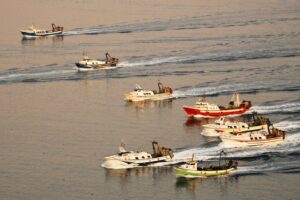
Harmful fuel subsidies often lead to a race to fish, damaging fishing stocks and the livelihoods of other fishermen.
Writ large, these subsidies put local and small-scale fishers at a particular disadvantage. Less than half of China’s total fisheries subsidies go to domestic and small-scale fishing in its own waters. This mirrors a global trend. When you look at the 10 countries that provide the most to their fishing industry in capacity-enhancing subsidies, 80% of funding goes to large-scale fishing, including for the construction of industrial, ocean-going vessels and distant-water bases that enable these fleets to fish so far from home.
In the global seafood market, small-scale fishers can sometimes struggle to compete against those boats with their long ranges, large holds and vast resources; subsidising those industrial distant- water fleets at disproportionate rates tips the scales even further.
China’s subsidy programme has an outsized impact on the global – and therefore the UK – seafood market. In 2020, the UK, as reported in the annual MMO statistics, imported seafood products from China worth £256m. Harmful fisheries subsidies distort market competition and access, and threaten the sustainability of global fish stocks; eliminating them is in the interest of all responsible fishing nations.
Members states of the World Trade Organisation now have the opportunity to end this practice, and to introduce transparent and standardised reporting. It’s time to stop subsidising this overfishing – to ensure that those fishing sustainably have a fair chance to catch and earn a living from the fish in their own waters.
UK SCIENTISTS JOIN WORLDWIDE CALL FOR SUBSIDIES BAN
Leading UK fisheries scientists, including Professor Michel Kaiser from Heriot-Watt University and Dr Bryce Stewart from the University of York, have signed a letter from 296 scientists, from 46 countries, that was presented to the WTO ahead of the crucial ministerial-level discussions due to commence this week in Geneva.
The letter, originally published in the international journal Science, sets out a series of recommendations including a halt to subsidies for distant- water fishing fleets, which it says must be eliminated to prevent overfishing on the high seas and in waters under national jurisdiction.
The letter continues: “Such subsidies threaten low-income countries that rely on fish for food sovereignty.” It goes on to say that any exceptions to the rules – known as ‘special and differential treatment’ – should be considered for small-scale fishers who use low-impact gears or who fish for subsistence, but only if decoupled from incentivising overfishing.
While fishing subsidies are a longstanding global issue, the scale of the problem was laid bare in 2016, when Chinese fishing vessels accounted for 17m of the 40m fishing hours performed worldwide, more than the 10 next biggest countries combined.
And, despite the UN’s sustainable development goal to end harmful fishing subsidies, China spent US$5.89bn in 2018, greatly increasing the catch capacity of its fishing fleets, including distant-water vessels.
Michel Kaiser, professor of fisheries conservation at the Lyell Centre at Heriot-Watt University, said: “In November, the WTO members have a rare opportunity at their ministerial meeting to reach an agreement to ban fishing subsidies that have negative outcomes for people and the environment.
“Helping the fishing industry move to more sustainable practices and technologies that lower greenhouse gas emissions from fishing would be a more constructive use of these funds.”
Dr Bryce Stewart, from the Department of Environment and Geography at the University of York and one of the co-authors of the letter, said: “I am delighted to join this global call for an end to harmful fisheries subsidies.
By encouraging overfishing, these subsidies are threatening livelihoods and food security across the world.”
Fishing News contacted DEFRA for comment on the ongoing talks, and a statement of the UK government position on the issue, but had received no reply at the time of going to press.
WTO MOVE TO END HARMFUL SUBSIDIES COULD BENEFIT UK INDUSTRY
A World Trade Organisation deal could deter overfishing – and increase the sustainability and profitability of the supply chain, write Isabel Jarrett and Nikolas Evangelides of The Pew Charitable Trusts

When they meet in Geneva on 30 November, trade ministers from the 164 members of the World Trade Organisation (WTO) will try to reach consensus around a globally binding agreement that could reduce fisheries subsidies, one of the key drivers of overfishing.
After two decades of WTO negotiations, members are closer than ever to forging a deal that will help protect the ocean’s ability to provide food, jobs and income to fishing communities across the globe.
Overfishing is arguably the greatest threat to marine biodiversity, and to fishers’ jobs. More than one-third of global stocks are fished at unsustainable levels, according to the United Nations’ Food and Agriculture Organisation. In EU waters, some populations are overfished by as much as 87%.
Despite significant strides forward that have seen many stocks recover, the UK is not immune. An audit by the NGO Oceana published in January suggested that in the UK, despite major recent progress, many of the most economically important stocks continue to be fished at unsustainable rates.
Overfishing can create a vicious cycle. Governments step in to support the fishing sector, and boats continue fishing even when market and operating conditions, such as dwindling catches and profits, indicate they shouldn’t. This overfishing, in turn, exacerbates the problem, threatening not only the marine ecosystem, but also livelihoods and the long-term sustainability of the sector.
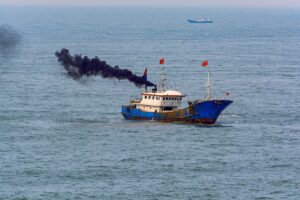
Many distant-water vessels receive fuel subsidies regardless of the state of their engine or build.
Governments around the world spend $22bn each year on these capacity-enhancing subsidies, which reduce fishers’ expenses for fuel, gear and vessel construction. Seven political entities – China, Japan, the EU, South Korea, Russia, the United States and Thailand – provide more than two-thirds of these harmful subsidies.
These payments more often than not benefit large, industrial vessels. Ninety percent of the financial support provided by the UK goes to the larger vessels in the fleet, despite the fact that they are the minority of total fishing vessels. UK waters also host an armada of subsidised foreign fleets, which further compete with the UK’s individual fishers.
In 2018, a total of 176 foreign vessels – which received an estimated $105.1m in subsidies from their governments – spent 188.6m kilowatt hours in fishing effort in UK waters in the Indian, Pacific and other oceans, fishing for tuna, toothfish and other species that often compete directly with catches made by bona fide UK vessels. More than 70% of these distant-water vessels were flagged to non-EU countries.
Fortunately, there is a solution. Eliminating all harmful fisheries subsidies could result in an increase of at least 12.5% in global fish biomass by 2050, according to research conducted at the University of California, Santa Barbara and funded by The Pew Charitable Trusts. That’s nearly 35m metric tonnes of fish – almost 90 times the amount of fish that UK vessels landed, or offloaded, in the UK in 2019.
The latest draft of the WTO treaty is structured around the elimination of three pillars of marine subsidies: payments to vessels and operators engaged in illegal, unreported and unregulated (IUU) fishing; payments for fishing on already overfished stocks; and payments for activities that enhance overcapacity and overfishing. Ceasing support to foreign vessels engaged in distant-water fishing is a critical component of the third pillar, and would likely benefit the UK fleet.
Major UK retailers are cheering on WTO members’ efforts to eliminate harmful subsidies. Through the UK-based Global Tuna Alliance – the world’s biggest network of seafood wholesalers and suppliers to the consumer – retailers whose success depends on sustainable fisheries have called for public funds to be redirected towards monitoring, control and enforcement, as well as climate change mitigation and adaptation projects that provide jobs in communities that have been disproportionately affected by overfishing.
An ambitious WTO subsidies deal would not only mean more fish in the sea, but would also help level the playing field for law-abiding fishers around the world, disincentivise unprofitable fishing operations, and combat practices such as IUU fishing.
As consumers in developed, market-driven economies such as the UK’s increasingly demand more sustainable practices in the supply chain, now is the time for trade ministers to reach an agreement that ends harmful fisheries subsidies.
This talk of WTO deals may seem a world away from the day to day realities for most UK fishers. But the actuality is that, on a daily basis, UK fishing vessels are operating on an unfair playing field.
Fish landed by UK vessels is competing in international markets against more heavily subsidised fish, which in turn is supporting levels of overfishing that can directly affect your own catch rates and profitability. A successful WTO outcome will be of great benefit to both the UK fishing industry and the marine environment.
Isabel Jarrett and Nikolas Evangelides work on The Pew Charitable Trusts’ project on reducing harmful fisheries subsidies.
SMALL-SCALE FISHERMEN URGE EU TO STOP SUBSIDING INDUSTRIAL FISHERIES
Ahead of the WTO ministerial summit, Low Impact Fishers of Europe (LIFE), representing a diverse group of small-scale vessels across the British Isles and the EU, joined calls for the EU to stop funding destructive industrial fishing.
In a briefing provided jointly with eNGOs, LIFE cited a recent report documenting subsidies that had driven overcapacity in the French and Spanish industrial fleets, whilst neglecting to allocate enough money for improving safety onboard, protecting nature or developing coastal communities.
LIFE executive secretary Brian O’Riordan said: “Misuse of EU subsidies has created a distorted sea in Europe, prejudicing the future prospects of small-scale, low-impact fishers and their communities, whose vessels comprise the majority of the fleet in terms of vessel numbers.
“Fisheries and the marine environment are public resources that must be managed sustainably if fishing is to have a future. Public money should be used for the public good, and not for individual or corporate gain.
“A fresh approach to funding should help us to fish better, not to fish more. We ask EU countries to be fair by making the right choice for the environment and low-impact fishers.”
ClientEarth fisheries lawyer Flaminia Tacconi said: “Governments must put their money where their mouths are and prioritise ocean protection – which is vital for fish stocks, climate change mitigation and the development of coastal communities.
“They should cease financing vessels for the big fishing industry, which only drives overcapacity, overfishing and the unnecessary killing of sensitive species.
“We need a fairer allocation of funds to turn this vicious circle into a virtuous one.”
This story was taken from the latest issue of Fishing News. For more up-to-date and in-depth reports on the UK and Irish commercial fishing sector, subscribe to Fishing News here or buy the latest single issue for just £3.30 here.

